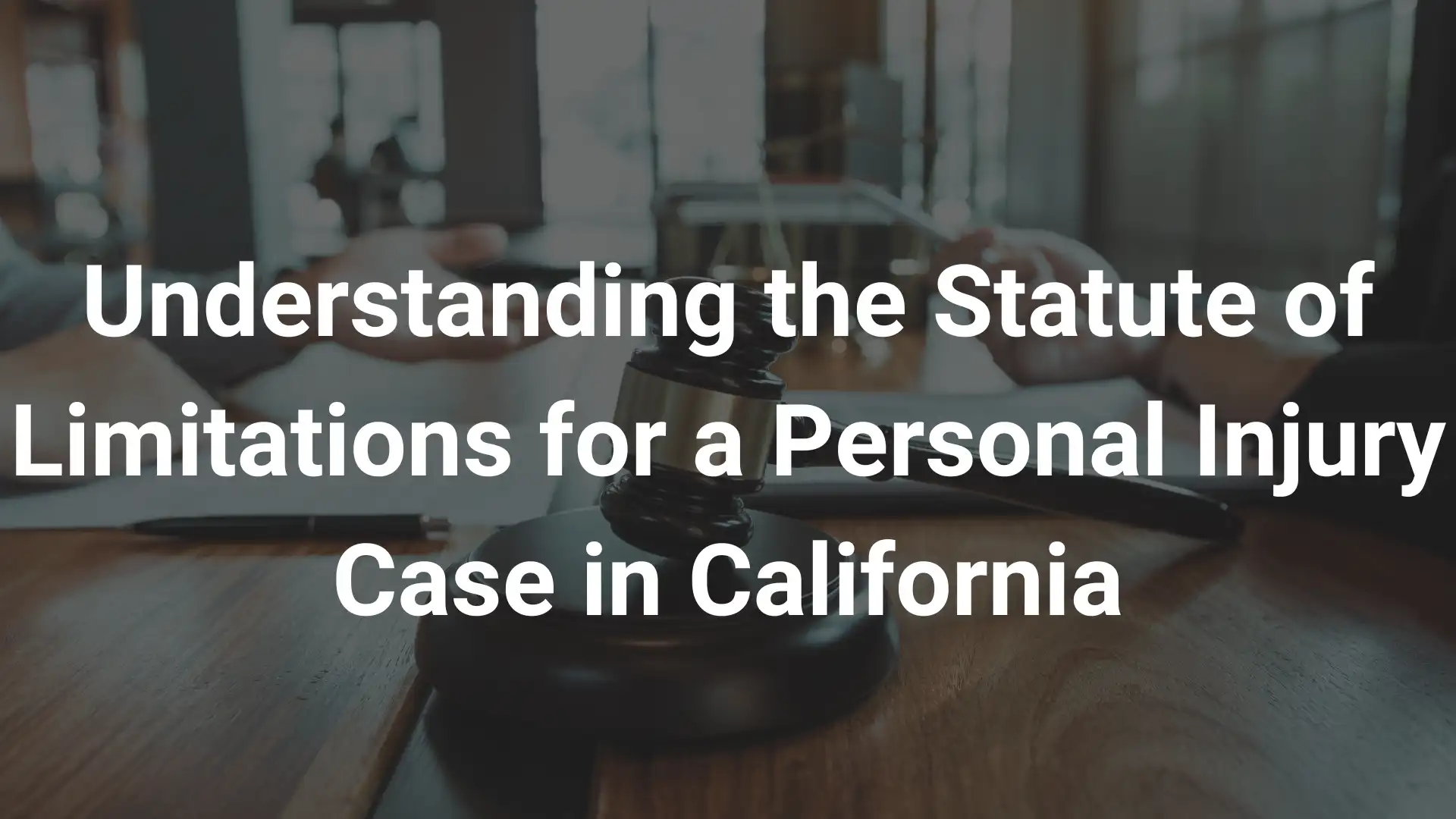 After an accident, dealing with paperwork and legal deadlines probably isn’t on your list. You have doctor visits, maybe time off work, and just trying to feel like yourself again. It’s understandable if the legal side takes a back seat. But in California, the clock starts ticking fast. The personal injury statute of limitations gives you a limited amount of time to take action—and if you miss that window, you might lose your chance to file.
After an accident, dealing with paperwork and legal deadlines probably isn’t on your list. You have doctor visits, maybe time off work, and just trying to feel like yourself again. It’s understandable if the legal side takes a back seat. But in California, the clock starts ticking fast. The personal injury statute of limitations gives you a limited amount of time to take action—and if you miss that window, you might lose your chance to file.
Here’s a quick breakdown of how that deadline works, why it matters, and what it could mean for your case.
What Is the Statute of Limitations for Personal Injury in California?
The statute of limitations is a legal countdown. It starts ticking from the date of your injury and limits how long you have to file a lawsuit. In most California personal injury cases, that countdown lasts two years from the date you were hurt. This deadline is written in the California Code of Civil Procedure Section 335.1.
So, for example, if you were injured in a car crash on May 1, 2023, you’d generally have until April 30, 2025, to file your personal injury lawsuit in civil court. This two-year deadline applies to a wide range of cases, including auto accidents, bicycle or pedestrian accidents, slip and falls, premises liability claims, dog bites, assault and battery, and just about any injury caused by someone else’s negligence.
If you wait too long and miss that window, even the most solid case can be thrown out before it gets heard. Courts in California don’t make many exceptions when it comes to filing deadlines.
Medical Malpractice and Other Injury Claim Deadlines
Not every injury case falls under the basic two-year rule. Certain types of personal injury claims, like medical malpractice, have slightly different filing deadlines.
In California, medical malpractice claims are typically bound by either one year from the date you discovered (or reasonably should have discovered) the injury, or three years from the date the injury occurred—whichever comes first. This is outlined under the California Code of Civil Procedure Section 340.5.
These cases can get complicated quickly, requiring expert opinions, detailed medical records, and technical analysis. That’s why it’s so important to act fast. When you’re trying to figure out what went wrong medically, the clock doesn’t stop ticking—and it’s easy for that deadline to sneak up on you.
Wrongful Death Statute of Limitations
For wrongful death claims in California, the statute of limitations is two years from the date of death—not the date of the injury. This matters in cases where someone survives their injuries for a period of time before passing away.
Are There Exceptions to the Statute of Limitations?
There are exceptions to the statute of limitations, but they’re limited and often misunderstood. Certain situations can pause—or “toll”—the clock, giving you more time to file a claim. For example, if the injured person is a minor, the statute of limitations doesn’t begin until their 18th birthday. The same goes for someone who is mentally incapacitated at the time of the injury; the clock may be paused until they regain capacity.
In other cases, like medical malpractice or toxic exposure, the deadline might be based on when you discovered the injury rather than when it happened. And if the at-fault person leaves California for a stretch of time, that period might not count toward the statute either.
These exceptions aren’t automatic, though. You’ll have to show why the clock should be paused, and that can get legally tricky. It’s the kind of thing where having a personal injury lawyer on your side can make a real difference.
Why Acting Quickly Is So Important
Even if two years sounds long, waiting to take legal action can seriously hurt your case. Here’s why:
- Evidence doesn’t stick around. Skid marks fade, businesses erase surveillance footage, and witnesses forget what they saw.
- Insurance companies set their own deadlines. You should notify them in a few days, especially if you’re relying on coverage from policies like uninsured motorist coverage.
- Doctors and records take time. You’ll need medical documentation, bills, and expert opinions to support your case. That doesn’t happen overnight.
- Negotiations can drag on. If you’re in talks with the other party’s insurance company, they may stall or delay—especially if they know you’re running out of time to sue.
Bottom line? The earlier you speak with an attorney, the better your chances of staying ahead of the clock—and the insurance adjusters.
Filing a Lawsuit vs. Filing an Insurance Claim

Let’s say you’re in a car accident and report the crash to your insurance company. Great—you’ve taken the first step. But that doesn’t stop the two-year legal deadline from running. If you’re still negotiating a settlement as the deadline approaches, you must file a civil lawsuit before the statute runs out, or you could lose your right to sue.
Don’t assume the other side will play fair or offer a deal just because you’ve been talking. Insurance companies often wait until the last minute—if they think you won’t sue, they’ll try to run the clock out.
How DJA Injury Attorneys Can Help
At DJA Injury Attorneys, we help injury victims in Huntington Beach and nearby areas stay on top of deadlines, make sense of the legal process, and take action after an accident. Whether you’ve been hurt in a car crash, experienced medical negligence, or faced something less common, we’ll help you figure out how much time you have to file based on your situation. We’ll also keep you on track with paperwork and filing requirements—because when you’re already in pain, the last thing you need is more stress.
Want to know how we handle these cases? Check out our personal injury attorneys at Huntington Beach to learn more. Or, if you’re ready to talk, visit our contact page or call (949) 229-7228 to schedule a free consultation. It doesn’t cost anything to ask questions—but waiting too long could cost you everything.
Related Posts
Understanding Personal Injury Claims in California
What to Do After an Injury: Protecting Your Rights & Maximizing Compensation
